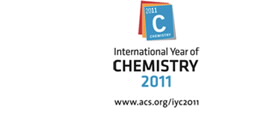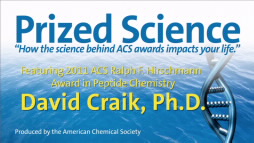FOR IMMEDIATE RELEASE | September 29, 2011
The Witch Doctors’ Gift: Potential New Drugs from a Cup of Tea
American Chemical Society’s latest Prized Science video
WASHINGTON, Sept. 29, 2011 — A physician on a medical relief mission to Africa sees pregnant women sip a medicinal tea prepared by local witch doctors when the time for birth arrives. Made from the leaves of a plant called “kalata-kalata,” the tea speeds labor and delivery. Scientists analyze the plant and discover a remarkable new substance. The research puts them on course for discovery of potential new drugs for diseases that affect millions of people worldwide.
That truth-is-stranger-than-fiction scenario is the topic of the latest episode in the 2011 edition of a popular video series from the American Chemical Society (ACS), the world’s largest scientific society. Titled Prized Science: How the Science Behind ACS Awards Impacts Your Life, the videos are available without charge at the Prized Science website and on DVD.
Media Contact
Michael Bernstein
202-872-6042
m_bernstein@acs.org
Michael Woods
202-872-6293
m_woods@acs.org
ACS encourages educators, schools, museums, science centers, news organizations and others to embed links to Prized Science on their websites. The videos discuss scientific research in non-technical language for general audiences. New episodes in the series, which focuses on ACS’ 2011 award recipients, will be issued periodically in the months ahead.
“Science awards shine light on individuals who have made impressive achievements in research,” noted ACS President Nancy B. Jackson, Ph.D. “Often, the focus is on the recipients, with the public not fully grasping how the award-winning research improves the everyday lives of people around the world. The Prized Science videos strive to give people with no special scientific knowledge the chance to discover the chemistry behind the American Chemical Society’s national awards and see how it improves and transforms our daily lives.”
New Drugs — From a Cup of Tea features the research of David Craik, Ph.D., winner of the 2011 ACS Ralph F. Hirschmann Award in Peptide Chemistry. Peptides are chains of amino acids, the building blocks of proteins. Craik is a professor at the University of Queensland in Australia, and the video describes his research, which promises to turn kalata-like proteins, called cyclotides, into new drugs for treating health problems, such as antibiotic-resistant bacteria and even AIDS, which affect millions of people worldwide. Proteins already number among the world’s most important medicines. Insulin, for instance, is a protein. Many other proteins could become life-saving medicines. But there’s a problem with proteins and smaller chunks of proteins called peptides. They cannot be taken by mouth because the body breaks them apart during digestion, just like the protein in meat or soy. The video explains how cyclotides have a strong internal architecture that keeps them active when taken by mouth.
Prized Science’s 2011 launch episode is a video featuring the research of Nobel Laureate Ahmed Zewail, Ph.D., winner of the ACS 2011 Priestley Medal, the society’s highest honor. Zewail is the Linus Pauling Chair professor of chemistry and professor of physics at the California Institute of Technology and recipient of the 1999 Nobel Prize in Chemistry. The video, Designing the World’s Fastest Camera, highlights Zewail’s work on imaging chemical and biological events that happen very quickly — in a femtosecond, which is a millionth of a billionth of a second. His latest work involves revolutionary new technology that enables scientists to visualize objects, not in three dimensions, but in four dimensions. In doing so, it promises to have sweeping applications in medicine, electronics and biological research.
The ACS administers more than 60 national awards to honor accomplishments in chemistry and service to chemistry. The nomination process involves submission of forms, with winners selected by a committee consisting of ACS members who typically are technical experts in the nominee’s specific field of research.
To automatically receive news releases from the American Chemical Society contact newsroom@acs.org
###



